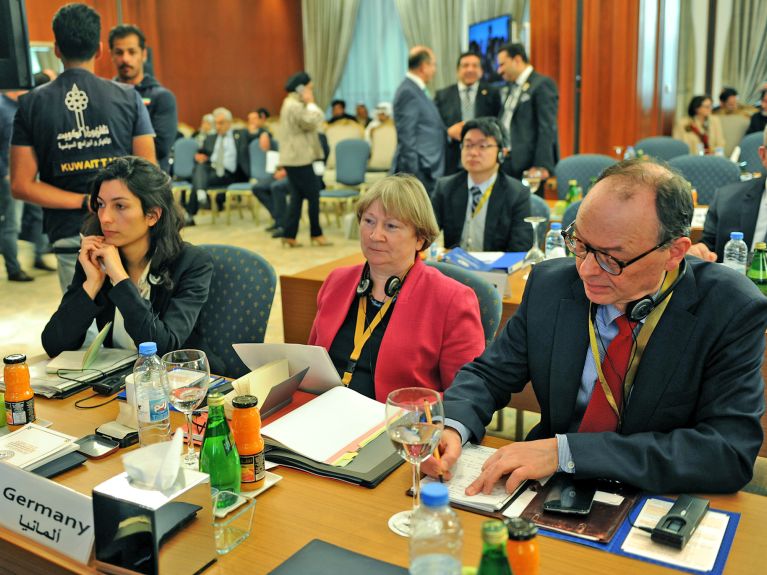“Every crisis concerns us to some extent”
Germany is highly active in crisis regions. Ekkehard Brose, Special Envoy for Crisis Prevention and Stabilization at Germany’s Federal Foreign Office, explains which issues are a particular focus.

Mr Brose, what is the remit of your department?
Foreign policy these days needs to be more than what used perhaps to be seen as “conventional” diplomacy. Germany’s engagement in Afghanistan made it clear to us early on that we must support political activities by pursuing concrete projects in the country. We call this the “foreign policy toolkit”.
You are not referring here to humanitarian aid, are you?
No, humanitarian aid has been an integral part of the Federal Foreign Office’s remit in crisis regions for 50 years. What is comparatively new is that we also engage directly by carrying out stabilising project work in crisis regions, for example in the form of mediation, support for security sector reform or the promotion of structures based on the rule of law. In 2015, we pooled our expertise in these various fields and created a new department at the Federal Foreign Office.

Was this also a response to the crisis in Syria and the large numbers of refugees in Germany?
It would be wrong to reduce our efforts to a desire to alleviate the reasons for migration. Every crisis concerns us to some extent in a globalised world – this is perhaps the fundamental insight to be gained from the events of 2015. Our destiny is linked on many levels with that of the rest of the world: with respect to transnational threats such as terrorism and to environmental, economic, cultural and political events.
Ultimately, it is a question of assuming even more responsibility for structures that give rise to order in the world. This can only succeed if a networked and multilateral approach is adopted.
Is it in fact possible to distinguish so clearly between humanitarian aid and stabilisation?
In principle, yes. Humanitarian aid is driven by needs, such as a shortage of food or water. During this phase, strategic political considerations do not really have any role to play, as the uppermost priority is to save human lives. By contrast, stabilisation is always geared towards political criteria, for example the question of what can be done to help a legitimate government to regain a foothold in a country ravaged by war and threatened by terrorism.
You have experienced such a situation yourself in Iraq, where you served as the ambassador from 2014 to 2016.
Iraq is indeed a prime example of stabilisation policy in the sense I have just outlined. Once territories had been liberated from IS control, it was important to give people the feeling that they were safe in their homes again and could enter public spaces without fear. Iraq illustrated how essential it is for example for a formerly embattled city to be cleared of mines before one even begins to think about further stabilisation and development. The presence of local police is equally vital when it comes to creating a sense of security and trust. This is why the Federal Foreign Office supports mine clearing programmes and the development of a police force in Iraq, as well as in many other regions around the world. More than four out of the six million internally displaced persons in Iraq have meanwhile returned to their home towns and villages – a resounding success.
Another relatively new field of action concerns climate and security. Is this about the effects of climate change?
Yes, and specifically about considering how the effects of climate change relate to our activities in the areas of humanitarian aid and stabilisation. One good example is the Lake Chad Basin in West Africa, one of the world’s most crisis-plagued regions. In this region, climate change serves to additionally exacerbate existing conflicts. We see it as our task to gain a better understanding of such interrelationships, also by working together with partners at the local level, and to take these into account in our stabilisation efforts. Germany will also use its membership of the UN Security Council to achieve this.
Dieses YouTube-Video kann in einem neuen Tab abgespielt werden
YouTube öffnenThird party content
We use YouTube to embed content that may collect data about your activity. Please review the details and accept the service to see this content.
Open consent formInterview: Klaus Lüber
Ekkehard Brose is the Special Envoy for Crisis Prevention and Stabilization at Germany’s Federal Foreign Office. At @AA_stabilisiert he reports on Twitter about current Federal Foreign Office projects in the areas of crisis prevention, stabilisation, post-conflict rehabilitation and humanitarian aid.
You would like to receive regular information about Germany? Subscribe here:



